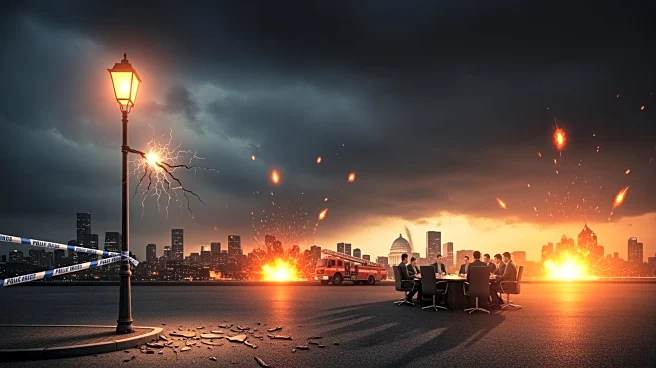What is the story about?
What's Happening?
A federal grand jury has declined to indict two individuals, Ray Collins and Jocelyne Robledo, who were charged with assaulting law enforcement agents during a protest outside an Immigration and Customs Enforcement (ICE) facility in the Chicago suburbs. The decision was made after the grand jury returned a 'no-bill,' meaning they chose not to file a true bill of indictment. This development occurred amidst a broader pattern of grand juries in cities like Los Angeles and Washington DC resisting indictments in cases related to federal law enforcement actions directed by the Trump administration. The charges against Collins and Robledo were dismissed by Magistrate Judge Gabriel Fuentes, although prosecutors retain the option to pursue charges within 30 days of the arrest. The case remains open as prosecutors decide on further actions.
Why It's Important?
The grand jury's decision is significant as it highlights a growing trend of local resistance to federal law enforcement actions under the Trump administration, particularly in cities targeted for immigration raids and other federal interventions. This resistance could impact the administration's ability to enforce its policies and may embolden local communities to continue protesting against federal actions they perceive as overreach. The decision also underscores the role of grand juries as a check on prosecutorial power, especially in politically charged cases. The outcome may influence how similar cases are handled in the future, potentially affecting the administration's strategy in deploying federal resources to manage protests and immigration enforcement.
What's Next?
Prosecutors have a 30-day window to decide whether to pursue charges against Collins and Robledo. The decision could set a precedent for how similar cases are handled, particularly in cities with active protest movements against federal immigration policies. The Trump administration may need to reassess its approach to deploying federal resources in cities where local resistance is strong. Additionally, the outcome may encourage other communities to challenge federal actions, potentially leading to more legal battles over the limits of federal authority in local law enforcement matters.
Beyond the Headlines
The grand jury's decision raises questions about the balance of power between federal and local authorities, especially in the context of immigration enforcement. It also highlights the potential for legal and ethical debates over the use of federal resources in local jurisdictions. The case may prompt discussions about the role of grand juries in safeguarding civil liberties and the importance of maintaining judicial independence in politically sensitive cases.















